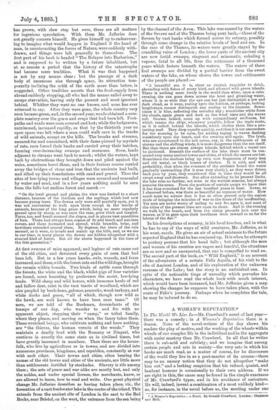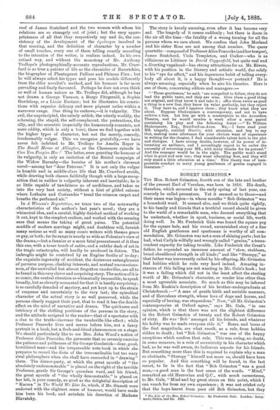A WOMAN'S REPUTATION.*
IN The World We Live Itr—Mr. Crawfnrd's novel of last year— there was a comedy ; in A Woman's Reputation there is a drama. None of the novel-writers of the day shows his readers the play of motive, and the working of the wheels within wheels of our complex life in the individual and in the aggregate with easier mastery than Mr. Crawfurd. In all that he writes there is sub-acid and subtlety ; and we imagine that among certain people and sets in society—the very sets in which his books are much read, as a matter of course, for he discourses of the world they live in as a past-master of its arcana—there may be an uneasy notion that they do not altogether "make him out," and a lurking suspicion that his refined, quaint, and lambent humour is occasionally to their own address. If we are right in this, the cause may be found in the simple exactness of Mr. Crawford's types, and in his avoidance of caricature. He will, indeed, invent a combination of a most unlikely kind— as, for instance, in the novel before us, the meeting under one • A "Woman's Reputation : a Novel. By Oswald Crawford. London : Chapman and Hall.
roof of James Scatcherd and the two women with whom his relations are so strangely out of joint ; but the easy appro- priateness of all that they respectively say and do, the con- sistency of the development of the equivogue involved in that meeting, and the definition of character by a number of small touches, every one of them telling exactly according to the intention of the writer, is realism indeed. In his own refined way, and without the monotony of Mr. Anthony Trollope's photographically-accurate reproductions, Mr. Craw- ford is as true a painter of life as the chronicler of Barsetshire, the biographer of .Plantagenet Palliser and Phineas Finn ; but he will always select his types and pose his models differently from the elder novelist's method, and his humour is far more pervading and finely flavoured. Perhaps he does not even think so well of human nature as Mr. Trollope did, although he has not drawn a George Vavasor, a Burgo Fitzgerald, a Sophie Gordeloup, or a Lizzie Eustace ; but he illustrates his convic- tions with superior delicacy and more piquant satire within a narrower range. One thing he eschews,—it is vulgarity. The -evil, the unprincipled, the calmly selfish, the utterly worldly, the scheming, the stupid, the self-complacent, the pretentious, the silly, and the eccentric (especially the humorously eccentric, not mere oddity, which is only a bore), these we find together with the higher types of character, but not the merely, coarsely, irredeemably vulgar. This we recognise gratefully,—we have never felt indebted to Mr. Trollope for Amelia Roper in The Small House at Allington, or the Cheeseacre episode in Can You Forgive Her ? The latter, even granting the humour of its vulgarity, is only an imitation of the Bristol campaign of the Widow Barnaby—the heroine of his mother's cleverest siovel—among her " dear Peterses." It is not only the vulgar in humble and in middle-class life that Mr. Crawford avoids, while drawing both classes faithfully though with a large recog- nition that in neither is vulgarity inherent and inevitable ; he is as little capable of tawdriness as of sordidness, and takes us into the very best society, without a hint of gilded saloons where Lothairs and Corisandes " tread the crimson carpet and breathe the perfumed air."
In A Woman's Reputation, we trace two of the noteworthy characteristics of the author's last year's novel ; they are a whimsical idea, and a careful, highly-finished method of working it out, kept to the simplest realism, and worked with the seeming ease that means the taking of great pains. The potential muddle of modern marriage might, and doubtless will, furnish many serious as well as many comic writers with themes grave or gay, or both; for its range is nearly as wide as Polonius's view of the drama,—but a funnier or a more fatal presentment of it than this one, with a truer touch of satire, and a subtler dash of art in the tragic catastrophe, will hardly be produced in fiction. The imbroglio might be contrived by an Eugene Scribe of to-day ; the exquisite ingenuity of accident, the dexterous entanglement of perverse purpose, clashing interests, and mutual unconscious- ness, of the unrivalled but almost forgotton vaudevilles, are all to be found in this very clever and surprising story. The notion of it is so comic, the central situation so whimsically impossible, to speak broadly, but so cleverly accounted for that it is hardly surprising ; is so carefully denuded of mystery, and yet kept up to the strain of suspense and uncertainty to the very last; the episodical character of the actual story is so well preserved, while the persons clearly suggest their past, that to read it has the double effect on the mind of narrative and drama. The quickness and intricacy of the shifting positions of the persons in the story, and the attitude assigned to the reader—that of a spectator with a clue to the truth—increase the vaudeville like effect ; while Professor Peacocke lives and moves before him, not a fancy portrait in a book, but a flesh-and-blood phenomenon on a stage. We should particularly like to see Mrs. John Wood's notion of Professor Alice Peacocke, the garments that so severely exercise the patience and politeness of Sir George Gooderich—dear, good, bewildered man—and the irrepressible note-book in which she prepares to record the dicta of the irreconcileable but too wary rival philosophers when she shall have succeeded in " drawing " them. The dinner-party, at which the great apostle of " the absolutely undemonstrable " is placed on the right of the terrible Professor, gentle Sir George's quondam ward, and his friend, the great apostle of " the wholly demonstrable," is placed on her left, is pure comedy, as good as the delightful description of " Karma " in The World We Live In, which, if Mr. Sinnett were endowed with the slightest sense of humour, would have made him burn his book, and antedate his desertion of Madame Blavatsky. The story is keenly amusing, even after it has become very sad. The tragedy of it comes suddenly ; but there is doom in the air all the time—the fatality of a wrong turning for all the persons whom we care about. We confess that John Morland and his sister Rose are not among that number. The queer quartette—composed of Professor Alice Peacocke (andher temper), James Scatcherd, Viola Templeton, and Cocker—who is as villainous as Littimer in David Copperfield, but quite real and a diverting vagabond—has strong attractions for us. Mr. Rivers, with his position in the literary and artistic world, due solely to his " eye for effect," and his ingenuous habit of telling every- body all about it, is a happy thought—or portrait P He is always amusing, especially when he airs his theories. Here is one of them, concerning editors and managers :—
" These gentlemen,' he said, are compelled to follow, they do not lead the public taste, and they are wise. Give them a good thing not original, and they know it and take it ; offer them twice as good a thing in a new line, they know its value perfectly, but they reject it. They have to, and I approve them ; they know what they are about. Suppose Shakespeare a contemporary, and not to have written a line. Let him go with a masterpiece to the Accordion Theatre, and be would receive a week after a neat parcel containing his play and the following letter :—" To William Shakespeare, Esq., Stratford-on-Avon. Sir,—I have read your MS. tragedy, entitled Hamlet, with attention, and beg to say that, making some allowance for your obvious want of experience in writing for the theatre, I find considerable talent both in the plot and dialogue. I have strong doubts, however, of its power of in- teresting an audience, and I accordingly regret to be under the necessity of returning your MS., with many thanks for its perusal." And the manager would be in the right. The public won't stand what is good and new too ; they want educating first, and they will only stand a little education at a time.' This theory was of inex- pressible comfort to many young gentlemen of genius engaged in literature."



































 Previous page
Previous page